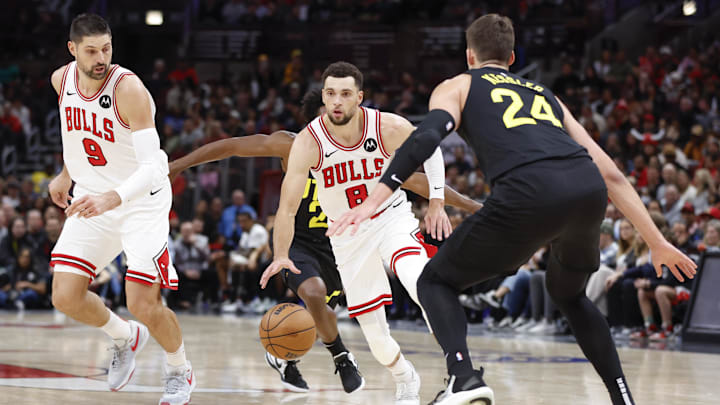Trading season is coming for the Utah Jazz. Once December 15 rolls around, a lot of options will open up. However, there's another NBA team who will have an even bigger firesale than Utah coming up - the Chicago Bulls.
The Bulls are in the same place as the Jazz, as they, too, would like to turn to their rebuild entirely. Jake Fischer reported on Marc Stein's Substack that the Bulls' three highest-paid players are available to acquire.
"No surprise, then, that Bulls executives, according to league sources, have been messaging to rival front offices that they are willing to discuss the majority of their roster in trade talks leading up to the Feb. 6 trade deadline. Most notably, sources say, Chicago has expressed a desire to move LaVine, Vučević and Ball — who collectively command nearly $85 million in salary this season," Fischer wrote.
This has been brought up before for what seems like years now. In fact, the Jazz had been reported as a potential suitor for LaVine during the offseason. That was later refuted, as their interest would make little sense, but this will impact how trading season goes for the Jazz and their potential trade partners.
Bulls may set the price if/when they do their trades
The Bulls will be sellers at the deadline and will also be more desperate to get rid of their guys because said guys are more equipped to help a team win than the Jazz's. At the same time, their values are arguably lower.
Fischer mentioned that teams want Bulls' youngsters Dalen Terry and Julian Phillips attached in any deal for any trade involving those aforementioned players because they're intrigued by their potential. That goes to show how low their value is.
In LaVine's case, they're trying to get rid of him as soon as possible without getting any assets because of how much he's paid. LaVine has been better this season with a clean slate of health, but he's paid like a franchise player, even though he hasn't shown himself to be one.
Fischer confirmed that Vucevic's value is set at multiple second-round picks. Ball's value is also pretty much nothing, and that's pretty self-explanatory.
So what does all of this have to do with the Jazz? If the Bulls make those trades before the Jazz do, and no one knows for sure if they will, that could set the market for what the Jazz should expect with the players they may trade this season.
The Jazz's most likely trade candidates are Jordan Clarkson, John Collins, and Collin Sexton. Walker Kessler is a trade possibility, but Utah shouldn't push to trade him as much as the others. Anyway, if the Bulls make those trades and get the minimal value that Fischer brings up, potential trade partners may try to tell the Jazz to expect the same thing from their available players.
That will hurt the Jazz's leverage if their intent is to get assets. The question is, will they want more draft assets for who they plan to trade? They might be satisfied with just getting their players off their payroll, and if trade partners don't want to pay that much, Utah will be happy to let those players stick around until their contracts expire.
Danny Ainge is known for playing hardball when he makes trades. He must consider where he is with some of the Jazz's players when he enters trade talks because the Bulls may have the upper hand in that regard since their reported mindset is "Just take them. We don't ask for anything. Take whatever you want!"
